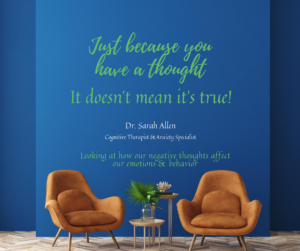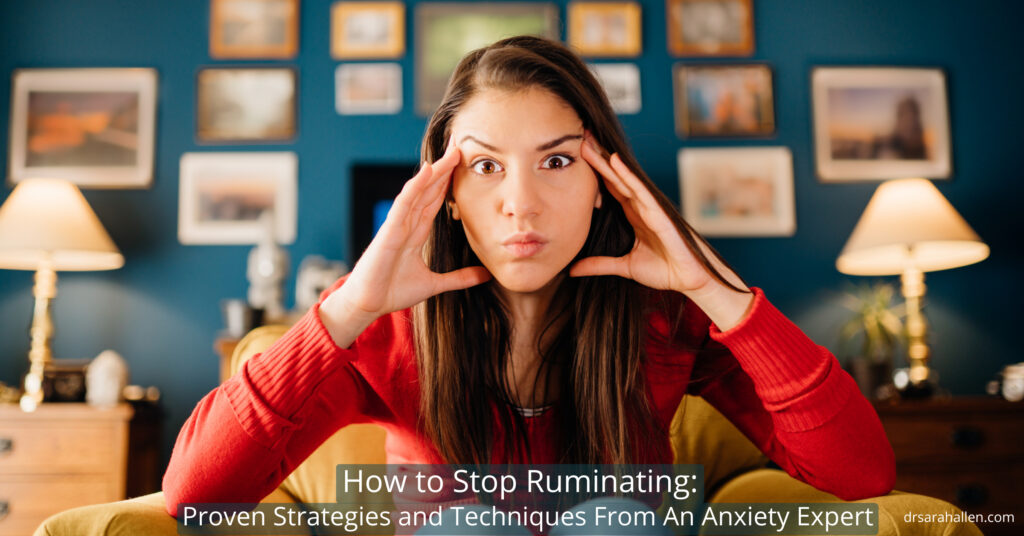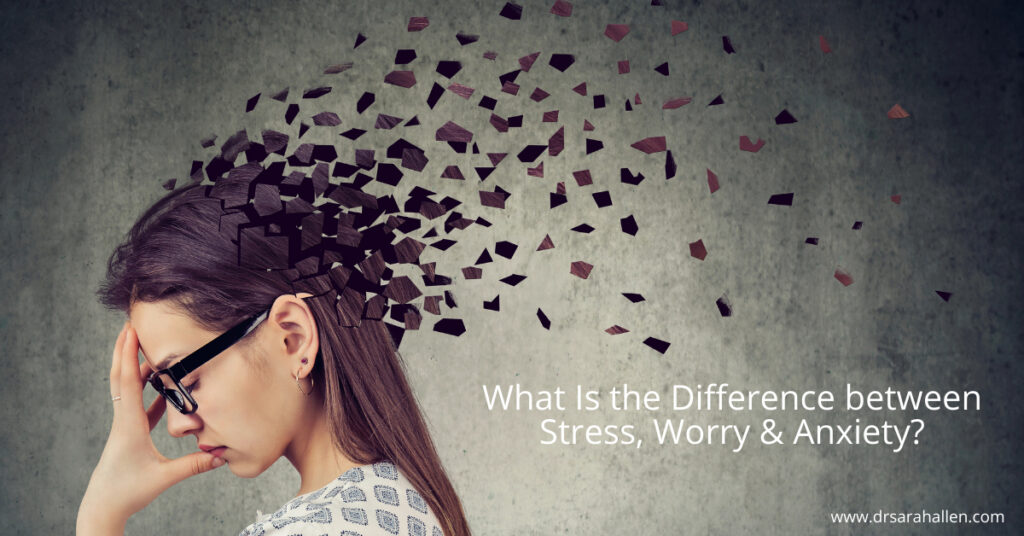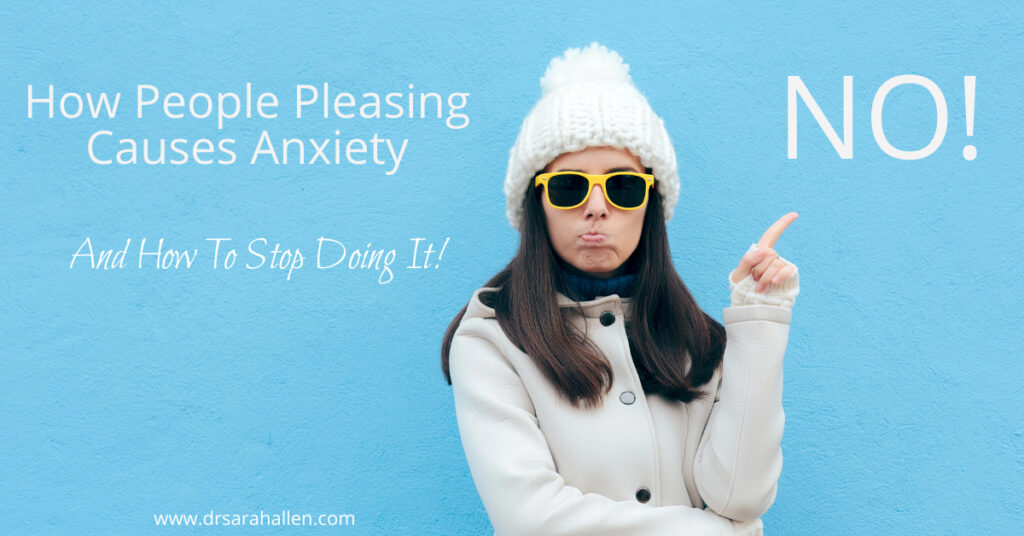
Did you know that the human brain is composed of approximately 100 billion neurons? Until recently we thought that the brain is fully developed (and therefore unchangeable) by the end of childhood and once you became an adult it was pretty much downhill for the brain.
In the past few years though there has been a huge amount of brain research that shows that the brain actually possesses a remarkable capacity to reorganize pathways, create new connections and, in some cases, even create new neurons. We now know our brains are not fixed, they have neuroplasticity. What does this mean? Basically we can change the way we think about things to change our responses to stress.
How does this relate to anxiety? Anxiety is more than just feeling stressed or worried, it’s a condition that can affect your brain in significant ways. Understanding how anxiety changes the brain can help you see why it feels so overwhelming and difficult to manage at times. The good news is that there are ways to retrain your brain to cope better with anxiety.
Interestingly, certain parts of the brain, like the amygdala and hippocampus, play big roles in how we experience anxiety. When these areas are overactive or not functioning as they should, anxiety can become more intense. Additionally, the brain’s chemical messengers, called neurotransmitters, also impact how we feel. Knowing about these can provide insights into why anxiety happens and how to address it.
As you can probably tell from reading my website, one of the tools I use to help people overcome anxiety is Cognitive Behavioral Therapy (CBT) as it is a highly effective method for managing anxiety. This therapeutic approach can help change the way your brain responds to stress and anxiety. By understanding and practicing different ways of thinking about things, you can learn to regulate your emotions better, change negative thought patterns, and adopt more useful behaviors. This article will explore how anxiety affects the brain and how CBT can be a powerful tool for positive change.
How Anxiety Changes the Brain
When you experience anxiety, your brain undergoes specific changes. These changes can affect how you think, feel, and even behave. One of the main ways anxiety affects the brain is by altering its structure and function. This can make it harder to manage everyday stress and can lead to persistent feelings of worry and fear.
Anxiety can make the brain’s fear centers, like the amygdala, more active. This heightened activity means you’re more likely to feel anxious or stressed even when there’s no real danger. At the same time, anxiety can weaken the connections in the brain that help regulate mood and think clearly. These changes can make it challenging to break free from patterns of worry and negative thinking.
Interestingly, the brain can change and adapt, a concept known as neuroplasticity. This means that with the right strategies you can help your brain become more resilient to anxiety. Neuroplasticity allows the brain to form new connections and pathways that support healthier thinking and behaviors. This offers hope and shows that anxiety doesn’t have to be a permanent state.
Key Brain Regions Involved in Anxiety: The Amygdala and Hippocampus
Two key brain areas that play a role in anxiety are the amygdala and the hippocampus. The amygdala is like an alarm system in your brain. It detects threats and triggers the body’s fight-or-flight response. When you’re anxious, the amygdala is often overactive, signaling danger even when there isn’t any. This can lead to constant feelings of fear and unease.
The hippocampus, on the other hand, is involved in memory formation. It helps you remember past experiences and is important for learning. Anxiety can affect the hippocampus, making it smaller and less effective. This can lead to difficulties in recalling positive memories and a tendency to focus more on negative experiences.
Together, these two brain regions influence how you respond to stress and anxiety. Understanding their roles helps explain why anxiety feels so overwhelming and persistent. But it also highlights why strategies that target these areas, like CBT, can be so effective. CBT works by helping the brain form new, healthier connections, thereby reducing the overactivity of the amygdala and improving the function of the hippocampus.
By focusing on these key areas and how they contribute to anxiety, you can better understand the importance of targeted treatments and the potential for recovery.
The Role of Neurotransmitters in Anxiety
Neurotransmitters are chemical messengers in your brain that play a crucial part in how you feel and think. When it comes to anxiety, four main neurotransmitters are especially important: Acetylcholine, Dopamine, Serotonin, and Norepinephrine. Each of these chemicals affects anxiety in different ways.
1. Acetylcholine: This neurotransmitter is involved in attention and learning. High levels of acetylcholine can increase alertness and arousal, which can sometimes contribute to feeling anxious, especially if you are overthinking or too focused on potential threats.
2. Dopamine: Often called the “feel-good” neurotransmitter, dopamine helps regulate mood and motivation. Low levels of dopamine can lead to feelings of sadness, a lack of pleasure, and withdrawing from friends and activities, all of which are common in both anxiety and depression.
3. Serotonin: This neurotransmitter is key for mood regulation and feeling relaxed. Low levels of serotonin are linked to increased anxiety and mood disorders. Boosting serotonin levels can help improve mood and reduce anxious feelings.
4. Norepinephrine: Known for its role in the fight-or-flight response, norepinephrine increases alertness and prepares the body to respond to stress. High levels of this neurotransmitter can make you feel on edge and anxious.
Understanding these neurotransmitters and their roles in anxiety can help you see why therapy, can be effective. Using CBT strategies to change the way you think about and respond to stress can help balancing these chemicals, learning leading to better mood control and reduced anxiety.
How Therapy Positively Changes an Anxious Brain
Cognitive Behavioral Therapy (CBT) is a powerful tool for changing how an anxious brain works. This type of therapy focuses on three main areas: cognitive restructuring, emotional regulation, and changing behavior. Through these methods, CBT can significantly reduce anxiety and improve your quality of life.
1. Cognitive Restructuring:
This involves identifying and challenging negative thought patterns that contribute to anxiety. For example, if you often think, “I can’t handle this,” CBT helps you to reframe it to something more positive like, “I can manage this step by step.”
Step 1: Identify your thoughts or self-talk and they make you feel.
Once you catch the negative thought you can learn a new way of thinking about it.
Step 2. Identify thought traps
There are many thought traps but perhaps the most frequent ones that I see are:
Filtering – only taking note of all the bad things that happen, but ignore any good things
Overgeneralizing – using words like “always” or “never” to describe situations or events
All-or-Nothing Thinking – it has to be this way or it’s no good
Mind-Reading – believing that we know what others are thinking or thinking they should know how we feel. Often we assume that they are thinking the worst of us. However, we can’t mind-read so need to communicate with people.
Overestimating – we believe that something that is unlikely to occur is actually about to happen e.g. “I will faint” “I’ll go crazy” “I’m dying”.
Remember – Just thinking something doesn’t mean it is true or it will happen!
Step 3: Challenge Your Negative Thoughts
Questions to ask yourself to help challenge your negative thoughts or self-talk”
• Am I falling into a thinking trap (for example, catastrophizing or mind-reading)?
• What is the evidence that this thought is true? What is the evidence that this thought is not true?
• What would I tell a friend if he or she had that thought?
• Am I confusing a “possibility” with a “probability,”? It may be possible, but is it likely?
• Am I 100% sure that _______ will happen?
• How many times has _______ happened before?
• Is really so important that my future depends on it?
• And my all-time favorite – What is the worst that could happen?
2. Emotional Regulation:
Learning to manage your emotions better is a key part of CBT. Techniques like deep breathing, mindfulness, and relaxation exercises can help decrease the intensity of anxious feelings. Practicing these methods can help your brain become better at controlling anxiety. For more information about these techniques read these two articles:
3. Changing Behavior:
CBT encourages you to face your fears and change your behavior in a way that reduces anxiety. For instance, if social situations make you anxious, CBT might involve gradually exposing you to social settings to build your confidence.
We can also use a CBT technique called Behavior Activation which involves increasing your activities, even if you don’t really feel like doing it. When depressed or anxious we often withdraw from activities and people. Withdrawing exacerbates negative feelings so by pushing yourself to actively participate in activities that are meaningful to you, it increases positive feelings. I encourage you to do this in small, attainable goals which you set yourself and this can boost your motivation over time. The key here though is to do meaningful activities that correspond to your value system.
Neuroplasticity – The Brain’s Ability to Change
Cognitive Behavior Therapy (CBT) also harnesses the power of neuroplasticity and neurogenesis. Neuroplasticity is the brain’s ability to reorganize itself by forming new neural connections. Neurogenesis is the process of growing new neurons. These capabilities mean that even an anxious brain can learn new ways of thinking and behaving, leading to lasting change. You may say that is all very well and good but why would I want to change my brain? The reason I am really interested in all this brain research is that most people who come to see me come because they are fed up of feeling worried, anxious and/or sad. By changing the way we evaluate things and react to them can change these negative pathways the anxious part of our brain has got so used to traveling down.
Are You On Automatic Pilot?
We have all been on automatic pilot when doing something e.g. we drive to a place without thinking how we got there. When our brain is disengaged brain change is switched off. However, when our brain is alert and engaged in an activity our brain’s plasticity switches are turned “on” because chemical neurotransmitters are released and we are then ready to facilitate change.
Is Your Brain Wired To Feel Anxious?
Because of life experiences and genetics some brains are more anxious than others and I discussed the brain regions and neurotransmitters that can affect anxiety. What does this mean in everyday life? When we think of doing something that causes us some anxiety our brain tells us “run away, don’t do it!”. Our body listens to the brain and produces adrenaline which cause physical sensations such as our heart beats faster, our hands get sweaty and our breathing gets shallow and this reinforces the idea that we “SHOULDN’T DO IT!” so we avoid that situation.
So How Do I Change This Anxiety Pathway In My Brain?
Brain change is a result of learning, our experiences and memory. Basically, by learning new ways to think and deal with anxious or sad feelings we can develop different connections in our brain. If we feel the fear and do it anyway this teaches our brain to develop a memory that actually doing this scary thing was manageable, nobody died and it really wasn’t nearly as bad as you thought it would be. We then feel more confident when that situation comes up again our brain says “Yeah, I can do that, it’s manageable”. The more times we do it the less scary it gets because our brain lays down each memory and makes a more positive pathway between our emotions and that type of event.
For example: Jane hates making phone calls (many people do). She thinks about it making that call and her heart beats faster, her fear rises and she gets someone else to call for her. Together we would make a list of stressful calls, 1 being a short call to a loved one and 10 might be calling in to a phone interview. If she starts with calls that are a fear level of 1, then 2 etc.. she will feel success and gradually make calls that are a level 4, 5, 6… etc until she overcomes her fear of making every day calls. She might still have an increased heart rate at a level 9 or 10 call but will have learned positive things to say to herself to reduce her anxiety and breathing techniques to calm the adrenaline.
According to Canadian scientist Donald Hebb, “Neurons that fire together, wire together.” If your thoughts focus on worrying and self-criticism, you’ll develop neural structures of anxiety and a negative sense of self. If you focus on your successes and have a positive, encouraging internal voice, you can become more confident and calmer.
Spend 15 Minutes A Day Doing Something New
The really important thing to remember is that to build new pathways in the brain you have to be alert and focused on what you are thinking and doing and to be most effective you need to try new things as the brain grows best when info is novel.
Do Something Scary
When we are doing something that scares us, our brain pays better attention to what is going on.
New habits + brain change. Scary new habits = quicker brain change.
Start small though rather then choosing to tackle something that causes you a lot of anxiety. You need to increase your confidence. I suggest you think of a hierarchy of anxiety-provoking situations then start with the one that is just a little bit out of your comfort zone.
Can Cognitive Behavior Therapy & Brain Science Work Together?
Yes! Earlier we discussed the Cognitive Behavioral Therapy (CBT) strategies of cognitive restructuring, emotional regulation and changing your behavior and the new brain research and CBT really complement each other. I ask clients to recognize when they feel a negative emotion such as anxiety, anger or sadness and “catch” the thought that they are having. These thoughts tend to be automatic and negative and because we are beating up on ourselves without even realizing it, they elicit a negative emotion. Who wouldn’t feel bad if they are telling themselves they can’t do something or they are bad in some way.
We then really focus on what you are thinking and challenge those thoughts so you can change your behavior and find out that the situation isn’t as bad as you are thinking it is. By thinking and doing things differently, especially things that are out of your comfort zone, you build new pathways in the brain. I have been using CBT techniques for twenty five years and they work! What I find totally fascinating though is that we can look at the recent brain studies about neuroplasticity and now understand the reasons behind why it works.
For an in-depth look at CBT read:
Conclusion
1. Being alert and focused when you try to do new things can change your brain.
2. Doing scary things retrains your brain to realize that that doing something anxiety-provoking is associated with Taking Action not Avoidance.
3. CBT strategies help you do new behaviors that cause brain change. You become confident rather than worried.
Anxiety can have a major impact on your brain, affecting key regions like the amygdala and hippocampus and altering neurotransmitter levels. However, understanding these changes is the first step toward managing anxiety more effectively. Cognitive Behavioral Therapy (CBT) offers practical techniques that can help reshape your brain, making it more resilient to anxiety.
By focusing on cognitive restructuring, emotional regulation, and changing behavior, CBT helps you develop healthier patterns of thinking and acting. This therapeutic approach leverages the brain’s natural ability to adapt and change, providing hope and practical solutions for those struggling with anxiety.

If you’re looking to take control of your anxiety, let’s start your journey with anxiety counseling. Contact me on the form below to book an appointment and learn how I can help you reduce anxiety and find more peace and balance.

If you have any questions, or would like to set up an appointment to work with me and learn how to reduce anxiety, please contact me at 847 791-7722 or on the form below.
If you would like to read more about me and my areas of specialty, please visit Dr. Sarah Allen Bio. Dr. Allen’s professional license only allows her to work with clients who live in IL & FL & the UK and unfortunately does not allow her to give personalized advice via email to people who are not her clients.

What Can I Read That Helps Me While I Am Waiting For My First Appointment With Sarah?
Download this free report to gain valuable insights and practical strategies for managing anxiety and worrying.




































